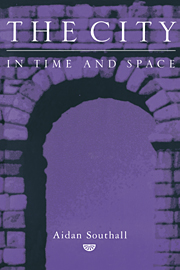Book contents
- Frontmatter
- Contents
- List of illustrations
- Acknowledgements
- Introduction
- 1 ‘Writing the city under crisis’
- 2 Pristine cities
- 3 Greece and Rome
- 4 Cities of the Feudal mode of production in Europe
- 5 Asian cities: Asiatic and Feudal modes of production
- 6 From colonial to Third World cities
- 7 The transformation of the city: from the Feudal to the Capitalist mode of production and on to the apocalypse
- Notes
- References
- Index
4 - Cities of the Feudal mode of production in Europe
Published online by Cambridge University Press: 10 December 2009
- Frontmatter
- Contents
- List of illustrations
- Acknowledgements
- Introduction
- 1 ‘Writing the city under crisis’
- 2 Pristine cities
- 3 Greece and Rome
- 4 Cities of the Feudal mode of production in Europe
- 5 Asian cities: Asiatic and Feudal modes of production
- 6 From colonial to Third World cities
- 7 The transformation of the city: from the Feudal to the Capitalist mode of production and on to the apocalypse
- Notes
- References
- Index
Summary
Chapter 4 portrays the decline of Rome and the cities of western Europe followed by the emergence of the Feudal mode of production and its characteristic merchant cities, culminating in the world cities which ushered in the Atlantic Age.
A narrative of city destinies: the self-destruction of Rome, early city-states and cities struggling in ruins
The city of Rome survived the repeated attacks of Huns and Goths, the loss of treasure and of population, as a skeleton. Its elite was cut off from its far-flung landed income. It never died, but dwindled from a million people to a quarter of a million in the fifth century, less than 50,000 in the sixth and less than 30,000 in the eleventh century. Only a quarter of the space within the walls was occupied, the rest reverting to gardens, pastures and waste, not fully occupied again until the nineteenth century.
Alaric tired of unkept promises and pillaged Rome for three days in 455. The Romans themselves were stripping the city of building stone and specially marble. During Belisarius' attempt at reconquest the city was besieged three times, its aqueducts were cut and for a while its inhabitants abandoned it. In 846 it was plundered by the Muslims. Finally in 1527 the Christian Emperor Charles V's armies plundered for eight days, destroying thousands of houses, churches and palaces.
It is said that the Romans bequeathed nothing urban except fortifications and the ‘habit of living in towns’ (Clarke, 1926:10). Nothing could be more significant than this habit. It kept alive the view that rural areas should be governed by cities and that only cities are civilized.
- Type
- Chapter
- Information
- The City in Time and Space , pp. 89 - 124Publisher: Cambridge University PressPrint publication year: 1998



